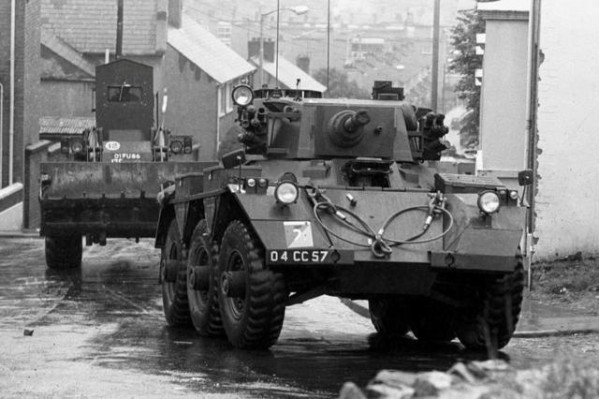
British Army’s Operation Motorman in July 1972 in Derry
THE brother of a Derry IRA man killed by the British Army has expressed concern to his legal team that a photographic record of his post mortem does not include an image of his suspected broken neck.
Seamus Bradley died in disputed circumstances in 1972 during Operation Motorman – a British Army bid to regain control of republican areas which had previously been considered no-go zones for the security forces.
Mr Bradley was shot in the Creggan neighbourhood and taken by soldiers to a nearby make-shift military station where he died.
The Army claimed the 19-year-old was shot while in a tree and sustained additional injuries when he fell.
However, his family claim an unarmed Mr Bradley was gunned down as he was running from the area and allege he sustained further injuries while in the custody of soldiers.
At a preliminary hearing ahead of a fresh inquest into the killing, a lawyer for Mr Bradley’s brother Danny questioned why 19 photographs sourced from the original post mortem did not include one of the neck area.
“Mr Bradley has always made it clear his brother had injured his neck during the course of events and might even have had his neck broken,” said David Heraghty.
“He is suspicious that there appears to be no photograph of the neck area.”
Coroner Mr Justice Adrian Colton requested that the photographer who captured the images be asked to make clear whether he recalled taking a picture of Mr Bradley’s neck.
He said the matter may become a “live issue” during the full inquest.
The hearing in Belfast Coroners’ Court also heard that the Ministry of Defence had been unable to confirm the identity of two soldiers who gave evidence to the original inquest, under the ciphers A and B.
Soldier A was the one understood to have fired the fatal shot while Soldier B was the man who gave permission for his colleague to fire.
Mark Robinson, representing the MoD, told the court the cipher list from the inquest could not be located within military records.
Mr Colton expressed concern, noting it was not the first inquest such an explanation had been offered by the MoD.
“I have noticed this trend in recent times saying ‘it just can’t be found’,” he said.
The next preliminary hearing has been scheduled for September.
Stormont deputy first minister Martin McGuinness had indicated a willingness to give evidence to the inquest about IRA activities in Derry in 1972 before he passed away in March this year.
Tags:




